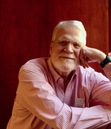Mark Scott Smith's Blog: Enemy in the Mirror, page 128
August 10, 2013
PINTEREST WWII Photos address change
I just changed my Pinterest address (where hundreds of WWII photos are pinned) and then realized that many of my followers there would not find the link. The new address is: http://pinterest.com/marksmithauthor


August 9, 2013
Vichy French Approve Japanese Occupation of Indo-China – July 1941

Japanese Troops Entering Saigon; Wikimedia Commons
On July 24, 1941 the Vichy French government, holding tentative control over the colony, granted Japan permission to establish military control over French Indo-China.


August 7, 2013
Japan calls up One Million Conscripts – July 1941
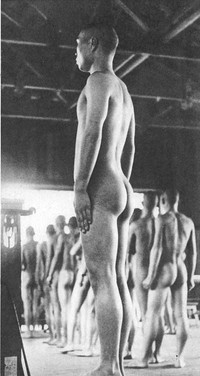
Japanese Conscripts 1941; Wikimedia Commons
In July 1941 Japan recalled her merchant ships from the Atlantic Ocean, and called up more than 1 million army conscripts.


August 5, 2013
V for Victory – 1941

Winston Churchill 1941;Wikimedia Commons
Following a BBC broadcast in January 1941 that suggested the use of a V for victoire (French: “victory”) and vrijheid (Dutch: “freedom”) sign during German occupation, Vs appeared on walls throughout Belgium, the Netherlands, and northern France.
Throughout the war in the subsequent “V for Victory” campaign, the three dot and a dash Morse code signal for V (•••-) , whose rhythm corresponded to the opening bars of Beethoven’s 5th Symphony, was used by the BBC as its call-sign in broadcasts to occupied Europe.


August 2, 2013
China Severs Diplomatic Relations with the Axis Powers – July 1942
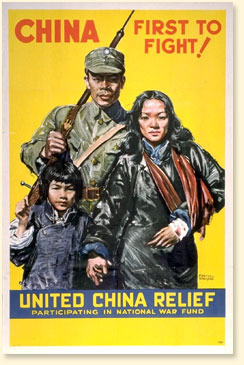
United China Relief poster ~1940; Wikimedia Commons
In July 1941, the Nationalist Chinese government severed diplomatic relations with Germany, Italy, and the other Axis Powers in support of the Allied war effort.


July 31, 2013
Japan Decides Not To Intervene in German-Soviet War – June 1941

Yosuke Matsuoka; Wikimedia Commons
Shortly after concluding a neutrality pact with the USSR, Japan’s Foreign Minister, Matsuoka Yosuke had ignored German hints about their upcoming Barbarosa offensive. In a meeting with his cabinet, he proposed that Japan now join the Germans in their attack on the Soviets. After a week of deliberation with the Army, Navy and Foreign Ministries, the Japanese leadership decided not to intervene and concentrate on the occupation of Southern Indochina to establish a “Greater East-Asia Co-Prosperity Sphere.”


July 29, 2013
U.S. Closes German Consulates – June 1941

The Roosevelt administration ordered the closure of German consulates across the United States. Three days later, the German and Italian governments closed American consulates in Axis-controlled areas of Europe in response.


July 26, 2013
Germany Invades the Soviet Union – June 1941
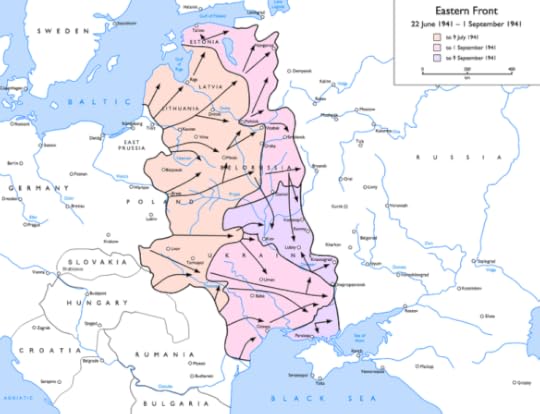
Using the codename Operation Barbarossa, Axis forces totaling 3 million men from Germany, Italy, Romania, Hungary and Finland launched a surprise attack against the USSR along a 2000 mile front on June 22, 1942.
Although Britain and the United States were wary of Stalin, Britain began providing the USSR with intelligence on German activity and intensified the bombing of major German cities. Soon, both Britain and the USA shipped many aircraft, tanks, food and medical supplies to the USSR.


July 24, 2013
Japan Threatens French Indo-China – June 1941
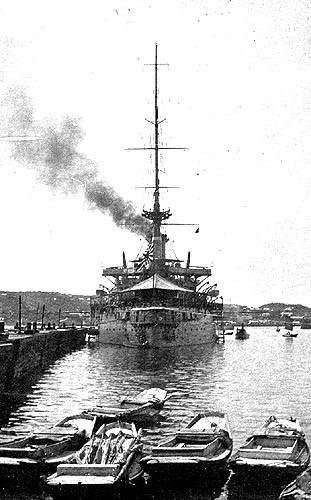
Warships of Japan; Wikimedia Commons
Japanese Demands on French Indo-China
With the collapse of the French army in Europe, the Japanese government demanded that the French allow the landing of Japanese troops in French Indo-China. Japanese warships took up naval stations off Indo-Chinese ports.


July 22, 2013
Joe DiMaggio’s Hitting Streak – May 1941

Joe DiMaggio; Wikimedia Commons
In 1941 New York Yankee Joe DiMaggio’s streak pulled his team out of an early slump, and led them to the World Series in which he received the Most Valuable Player Award.


Enemy in the Mirror
I began by posting events around the turn This website www.enemyinmirror.com explores the consciousness, diplomacy, emotion, prejudice and psychology of 20th Century America and her enemies in wartime.
I began by posting events around the turn of the 20th century as I was researching my first novel about the Pacific War. I continued through WWII for my second novel about the Battle of the Atlantic. Now I am beginning to look at the Cold War as I gather information for my next novel about the Korean War. ...more
- Mark Scott Smith's profile
- 7 followers



